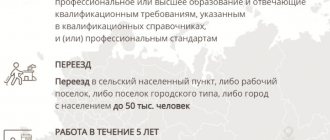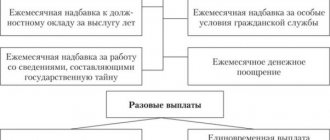If previously teachers’ salaries were approximately the same for everyone, now each of them earns their own “bonuses.” The provision on incentive payments to teaching staff and other workers is enshrined in Art. 129 of the Labor Code of the Russian Federation (hereinafter referred to as the Labor Code of the Russian Federation). It states that remuneration consists of 3 components:
- basic salary;
- various types of compensation;
- incentive bonuses.
A similar division can be seen in Government Decree No. 583, published on May 5, 2008. It establishes the payroll system for public sector employees.
The size of the basic salary is determined by the qualifications of the teacher and the number of classes he has taught (the so-called academic hours). The amount of compensation depends on the teacher’s working conditions: whether he goes on business trips or teaches in rural areas. The amount and procedure for incentive payments are established in the documents of the educational institution. Therefore, each school has its own criteria for calculating bonuses.
What is important when calculating allowances?
Although each educational organization accepts individual local documents, they must comply with certain federal standards. The above-mentioned Resolution No. 583 states that the school regulations must contain the following information:
- how exactly payment criteria are determined;
- in what order are employees rewarded?
- what requirements must a teacher meet in order to receive a salary increase;
- where does the funding for the distribution of incentive payments come from;
- whether the educational institution is engaged in additional business activities (for example, part of the building is rented out) so that the profit from it can be distributed among employees.
Also, local acts must comply with the recommendations given in the letter of the Ministry of Education of the Russian Federation “On the development of performance indicators” No. AP-1073/02, published in 2013. Among them, the following criteria for payments in 2021 are highlighted.
- Organization of additional extracurricular projects with the class (going on excursions, participating in social events - visiting veterans, orphanages, cleaning areas, motivating students to enroll in clubs, sections, classes for additional education).
- Involving students in various research projects, their coordination and final assessment of their achievements.
- Improving children's learning ability: payments are made to teachers whose students begin to write tests and laboratory works better and show higher results in exams than before.
- Involving children to participate in various school, city, municipal, regional and all-Russian competitions, relay races, olympiads, competitions: if the students successfully demonstrate themselves, the teacher is awarded additional points.
- Using information and communication technology when conducting classes, organizing work with children and their parents or guardians, creating virtual classes.
- Compliance with educational standards, introduction of innovative developments into the basic program for effective work with students.
- Paying attention to the physical health of children, organizing sports events.
- Conducting conversations with students from disadvantaged families and their relatives, facilitating the integration of such children into the classroom.
- Development of specialized stands, corners and mini-museums in thematic classrooms.
- Timely submission of reports, competent completion of documents.
- Attending courses to improve personal qualifications.
Such payment criteria are designed to ensure that teachers are interested in improving the quality of education. Teachers are required to continually improve their professional skills. However, full compliance with all criteria is difficult in practice.
How are the points distributed on the score sheet?
The format of the teacher self-assessment sheet is established in each educational institution separately. Based on the study of such documents, it is possible to identify the approximate structure of the assessment sheet and the number of points assigned to each item.
- Children's educational achievements are awarded from 0.5 to 5 points. Achievements include participation in various competitions, competitions, conferences, and olympiads. Moreover, the larger the event, the higher the score. For example, for an Olympiad held only within the school, the minimum score is 0.5 points. But if a child participates in competitions on an all-Russian scale, then the teacher is given a maximum score of 5. Additional points are awarded if the student takes a prize. The grade is assigned for each student and for each subject separately. That is, if a teacher has one child who participated in a city Olympiad and another in a regional Olympiad, then, for example, the first participant gets 2 points, and the second one gets 3. The total score is 5.
- The quality of students' knowledge is assessed from 1 to 3 points. The more strikers and excellent students in the class, the higher the bonus. Preparation for the Unified State Exam is assessed with separate points. If during interim testing it is discovered that the child completed the tasks 100%, then the teacher is entitled to a salary increase.
- From 3 to 5 points can be given to a teacher who is engaged in self-education and participates in teaching competitions. Attending various courses and demonstrating your professional qualities in competitions allows you to increase your salary.
- From 1 to 9 points are awarded to teachers who share their professional experience with colleagues and the scientific community. If a teacher participates in various conferences, publishes his own methodological developments, lesson notes, maintains a professional blog or video account, writes scientific articles, publishes his own books, then the management is obliged to reward him.
- From 0.5 to 5 points are assigned for effective work with the class and parents of students. If children eat in the school cafeteria, have class hours with them, parents attend school meetings, all together organize various events (clean-up work days, excursions, fairs), participate in school and city holidays, then the teacher receives appropriate bonuses.
- Teachers receive from 1 to 5 points for timely completion of documents and reports, carrying out instructions from the director or head teacher, and checking the proper status of students’ diaries.
Schools may also have other criteria for the teacher self-assessment sheet. For example, in republics where the educational process can be conducted in the local language, they can add points for instilling in children a love for their native land.
What incentive payments are there for teachers?
where Salary is the salary amount established according to the qualification category; Compensation - the amount of additional payments accrued for the intensity of work (substitute work, combining positions, teaching children with disabilities, teaching activities in rural areas, etc.); Allowances are incentive payments accrued as an additional salary.
Allowances for teachers: for category, for length of service, for experience
The income of public sector workers is generally regulated by all-Russian and regional laws and regulations. This technique does not fully meet the conditions of market relations. Therefore, the main personnel law - the Labor Code - contains a rule on the transfer of part of the powers to formulate payments to enterprises, including in the field of education. That is, teams get the opportunity to influence the amounts to be issued.
Let us recall that in the clarifications dated May 28, it is recommended to stipulate in the collective agreement that the temporary replacement of a teaching worker who is absent for a long time due to illness and other reasons, carrying out classroom management, by another teaching worker is carried out with the establishment of appropriate payments for classroom management in proportion to the time of replacement.
You might be interested ==> From what time is the premium for a teacher’s category calculated?
For the first type of certification (for compliance with the position held), a special certification commission is created at the school. It includes school teachers and may include representatives of the governing body and trade union organization.
Difference in salaries between categories for teachers
So, mandatory certification of teachers, as mentioned earlier, is carried out every five years. The procedure under consideration is carried out during a commission meeting and in the presence of the person being certified. It is considered competent if at least two thirds of the total number of commission participants are present at the meeting. According to the latest data from Rosstat, the national average salary of a school teacher is 42 thousand rubles per month. But this figure in itself doesn’t say much. In half of the regions of Russia, teachers receive from 23 to 30 thousand rubles. At the same time, in the Yamalo-Nenets Autonomous Okrug - 103, in Chukotka - 113 thousand (including “northern” allowances), and in Moscow - 116 thousand.
7. Allowances for the qualification category are established based on the results of certification of teaching and management employees (heads of structural divisions, senior foremen and directors (chiefs, heads) of branches) of educational institutions holding a license for educational activities.
2. The head of the education management body and the head of the educational institution, on the basis of the decision of the certification commission, within a month, issue an order to assign a qualification category to the employee and to establish a bonus for the qualification category from the date of the decision of the certification commission.
The amounts of other types of allowances and additional payments for additional types of work (class management, checking written work, managing educational and consulting centers, school boarding schools, evening and correspondence departments and other additional payments) are determined from the tariff rate (salary) according to the tariff without taking into account allowances for the qualification category .
Work experience is of considerable importance. Student-hour wages Accountants in many regions of Russia, including Moscow or the Kaliningrad region, are thinking about how to calculate a teacher’s salary based on hours worked.
- insignificant time of work in a training institution.
- the employee is on maternity leave and child care until the child reaches 3 years of age;
- on the day of submitting the application, the current category has expired;
- the secondary or higher education received does not coincide with the direction of the employee’s current activity;
- there was a certain break during the performance of work duties;
Category allowance for teachers
Supplement for academic degree. This type of bonus is an additional way to motivate teachers with a candidate of science degree, associate professor, professor, academician of science. We emphasize that the amount of bonuses and the procedure for assigning them are approved at the regional level. Thus, incentive payments in different regions of the Russian Federation may differ significantly from each other.
20 Apr 2021 semeiadvo 309
Share this post
- Related Posts
- What does the state give for the 5th child in 2021?
- Registration in gardening of the Leningrad region in 2021
- Regional surcharges for a third child in the Krasnodar region 2021
- Benefits for low-income families in the Nizhny Novgorod region
How to calculate the due premium?
Supplements of 5-10% of the basic salary are given to teachers who:
- extensive experience in teaching;
- have years of service for working with children;
- there are various honorary titles and awards;
- there is a class management (the amount of remuneration is fixed and amounts to 1 thousand rubles);
- confirmed qualification category in the specialty.
The total bonus amount can be up to 50% of the base salary. Points are taken into account separately.
An example of calculating bonuses for points received
- The school has 70 thousand rubles in its budget intended for bonuses for teachers. Within a month, the 5 best teachers were identified. Two of the teachers scored 37 points, two more scored 43 points, and the last one scored 51 points.
- The entire amount of points for the month is calculated. (37*2) + (43*2) + 51 = 214.
- Now the funds allocated for premiums are divided by the number of identified points to find out how much a unit is worth in the assessment system. 70,000 / 214 = 327.1 rub.
- A personal bonus is calculated for each teacher. For example, someone who received 51 points based on the results of their work can count on a payment in the amount of 51 * 327.1 = 16682.1 rubles.
The given example is conditional and only shows how calculations need to be made.
A teacher must constantly monitor his reputation. If a student’s parents receive a complaint against a teacher, even the points already awarded may be removed from the student.
Allowances for teachers according to NSOT: for category, for length of service, for experience
We emphasize that the amount of bonuses and the procedure for assigning them are approved at the regional level. Thus, incentive payments in different regions of the Russian Federation may differ significantly from each other. Also, regional authorities can adjust the approach to determining recipients of a particular allowance. For example, a bonus for experience in the Oryol region is paid only to those teachers who do not have a qualification category. If an employee of an institution is qualified, then he is assigned a bonus for his qualification category, without the right to receive an incentive payment for length of service.
You might be interested ==> Sale of shares in real estate 2021 Gk
Calculating a teacher's salary with a bonus: step-by-step instructions
Based on the regulatory documents of the region, it is necessary to determine the teacher’s right to a bonus in accordance with professional length of service, qualification category, education, and the presence of an academic degree.
The idea of motivating the best employees by accruing additional material rewards is not new: it has been practiced in private organizations for many years, but in the field of state regulation of the educational sector, the concept of incentive payments to teachers was introduced relatively recently, in accordance with the decree of the Government of the Russian Federation “On the introduction of new remuneration systems... » dated 05.08.2008 No. 583. In order to restructure the payment of teaching labor and in accordance with Art. 129 of the Labor Code of the Russian Federation, the new government initiative provided for:
The procedure for calculating and paying incentive bonuses is determined by the content of employment contracts (section “Remuneration”). If contracts contain general wording indicating the possibility of accruing additional payments if the organization has the capabilities, payment of incentive additional payments remains the right, and not the obligation, of the employer. But if the employment contract stipulates the fact that the salary consists of the official salary, the amount of compensation and incentive accruals, and also specifies criteria for assessing the effectiveness of teaching work, then the abolition of monetary subsidies for performance can be regarded as a violation of the terms of the employment contract on the part of the employer with subsequent application sanctions.
In what cases is it possible to cancel incentive payments for teachers?
Make the following change to the Decree of the Government of the Kyrgyz Republic “On the introduction of new conditions of remuneration for employees of educational organizations” dated January 19, 2011 No. 18: paragraph 3 after the words “high mountains and remoteness,” add the words “qualification category.” 4. Include in the resolution of the Government of the Kyrgyz Republic
Most often, qualification categories are assigned to workers in the fields of education, medicine, science, sports, and so on. The category bonus is in the form of percentage payments depending on the employee’s basic salary. For example, for citizens who have received the second category, the premium can be set at 30%, for receiving the first category - 40%, for the highest - 50%.
- for a teacher, a salary is established in the amount approved by regional executive authorities, but not less than the amount previously in force under the Unified Tariff Rate;
- The teacher has the right to receive bonuses accrued for the qualification category, work experience, level of education and registration degree (if any).
Remuneration of teachers and additional payments for qualifications
where Salary is the salary amount established according to the qualification category; Coefficient – bonus coefficient approved by the regional executive authority in accordance with the type of incentive payment.
You might be interested ==> Amount of benefit for a single mother in Orel
The management sets a certain cost for one academic hour (one lesson at school, half a lesson at a college or university). But sometimes the formula also includes the number of students in each class. In secondary vocational and higher education, the number of students is used only when calculating fees for exams and tests.
Every year, educational institutions approve tariffs. For a salary rate, a teacher works a certain number of hours. Based on this, the base salary is determined. But increasing coefficients are applied to it, allowing you to increase income:
Income = 6,000 × 23 / 18 × 1.15 = 8,817 rubles.
Another important question is what the salary of a subject teacher consists of. The letter of the Ministry of Education and Science dated November 26, 2006 No. IK-244/03 stated that increasing coefficients are also used for the complexity and priority of the subject. Teachers have the right to count on this privilege:
The legal topic is very complex, but in this article we will try to answer the question “How much extra is a teacher paid for the highest category.” Of course, if you still have questions, you can consult with lawyers online for free directly on the website.
Additional payment for teachers in rural areas
Teachers working in towns, villages or villages receive additional incentive payments in the same amounts as their urban colleagues. However, their size can be much smaller, since the budget of a village or town is usually small.
Law “On Education in the Russian Federation” No. 273-FZ, which came into force in 2012, in paragraph 8 of Art. 47 establishes additional compensation bonuses and benefits for teachers in rural schools:
- assistance in obtaining an apartment or house;
- benefits for paying for housing and utility services;
- a one-time allowance for adaptation to a new place of residence.
Also, if a teacher only travels to a rural school to teach classes, but does not live in this locality, he may be partially compensated for travel costs.
The payment criteria for teaching staff in 2021 are only partially regulated by law. Educational institutions, based on their funding capabilities, approve the form of evaluation sheets for teachers. On their basis, remuneration is paid to the most active teachers.








